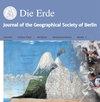A political ecology of green territorialization: frontier expansion and conservation in the Colombian Amazon
IF 0.6
4区 地球科学
Q3 GEOGRAPHY
引用次数: 10
Abstract
After decades of civil war, the Colombian government has recently declared the Amazon as a model region for green growth and low carbon development. The Amazon Vision programme, launched by the Colombian government in 2016, seeks to contribute to forest conservation, climate mitigation, poverty reduction and peace building. The Amazon Vision fundamentally reframes the Colombian Amazon from a ‘narco frontier’ that needs to be liberated from guerrilla influence, organized crime and peasants destroying forests for coca cultivation, to a net CO2 sink with enormous potential for green growth and poverty reduction. Drawing on historical and empirical qualitative research in Guaviare and complemented by a quantitative land cover classification, this article builds on the concept of ‘green territoriality’ to investigate the extent to which the shift towards conservation affects property rights and the ability of indigenous groups and peasants to access land and natural resources. We illustrate how the reframing of peasants from protagonists of development and frontier expansion to villains, and of indigenous communities from underdeveloped forest dwellers to environmental guardians, has created land conflicts and affected the legitimacy of their respective property rights. In both cases, the Amazon Vision strengthens conservation policies and challenges existing land rights but also creates new windows of opportunity for the land claims of indigenous communities while reinforcing conceptualizations of social differentiation among dwellers of the Amazon.绿色属地化的政治生态:哥伦比亚亚马逊河流域的边界扩张与保护
经过几十年的内战,哥伦比亚政府最近宣布亚马逊地区为绿色增长和低碳发展的示范地区。哥伦比亚政府于2016年启动了亚马逊愿景计划,旨在为森林保护、减缓气候变化、减少贫困和建设和平做出贡献。亚马逊愿景从根本上重塑了哥伦比亚亚马逊地区,从一个需要从游击队影响、有组织犯罪和农民破坏古柯种植森林中解放出来的“毒品边境”,到一个具有巨大绿色增长和减贫潜力的二氧化碳净汇。本文借鉴了Guaviare的历史和实证定性研究,并以定量土地覆盖分类为补充,以“绿色领土”的概念为基础,调查了向保护的转变对产权以及土著群体和农民获得土地和自然资源的能力的影响程度。我们说明了农民从发展和边疆扩张的主角到恶棍的重新塑造,以及土著社区从不发达的森林居民到环境保护者的重新塑造,如何造成了土地冲突,并影响了他们各自产权的合法性。在这两种情况下,亚马逊愿景都加强了保护政策,挑战了现有的土地权利,但也为土著社区的土地主张创造了新的机会,同时强化了亚马逊居民之间社会分化的概念。
本文章由计算机程序翻译,如有差异,请以英文原文为准。
求助全文
约1分钟内获得全文
求助全文
来源期刊

Erde
GEOGRAPHY, PHYSICAL-GEOSCIENCES, MULTIDISCIPLINARY
CiteScore
2.90
自引率
6.20%
发文量
0
审稿时长
>12 weeks
期刊介绍:
DIE ERDE is a publication of the Geographical Society of Berlin
DIE ERDE is a scientific journal in Geography, with four issues per year with about 100 pages each. It covers all aspects of geographical research, focusing on both earth system studies and regional contributions.
DIE ERDE invites contributions from any subfield of both Physical and Human Geography as well as from neighbouring disciplines.
 求助内容:
求助内容: 应助结果提醒方式:
应助结果提醒方式:


